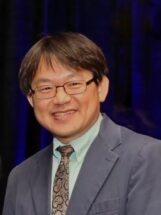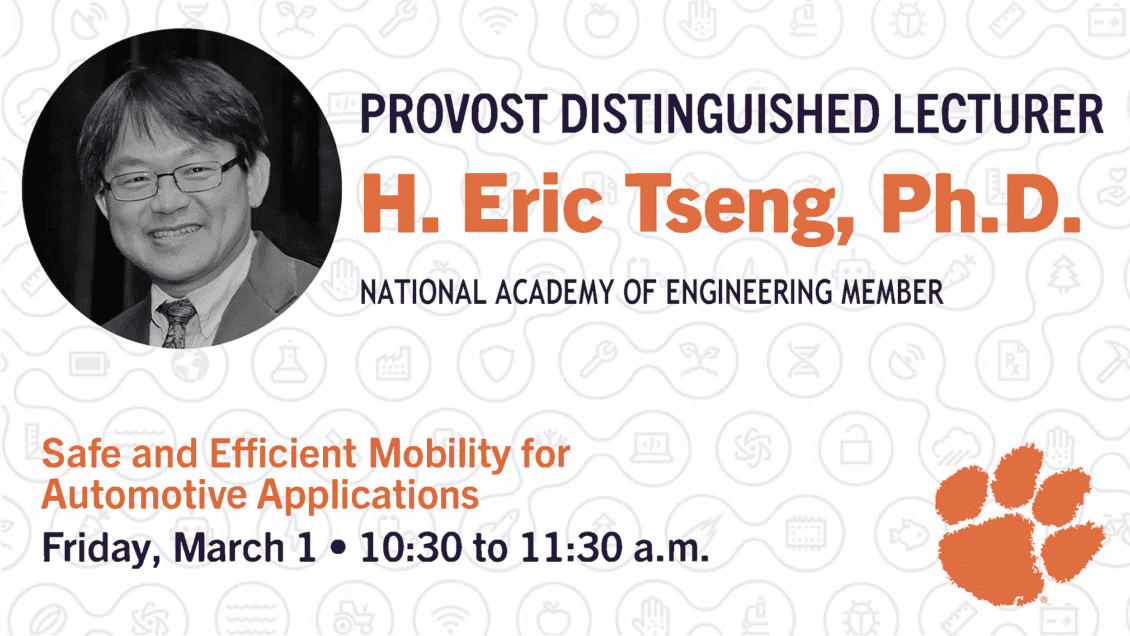
Clemson University’s Office of the Provost and the College of Engineering, Computing, and Applied Sciences (CECAS) will host H. Eric Tseng as a Provost Distinguished Lecturer on Friday, March 1, to deliver his talk and research efforts on “Safe and Efficient Mobility for Automotive Applications.”
After nearly three decades at Ford Motor Company, where he most recently served as senior technical leader of controls and automated systems in research and advanced engineering, Tseng retired in 2022.
In 2021, he was honored with a National Academy of Engineering membership for contributions to control systems for enhancing vehicle safety.
Safe and Efficient Mobility for Automotive Applications

Friday, March 1 | 10:30 a.m. to 11:30 a.m.
Watt Family Innovation Center Auditorium
No registration is required.*
*Accommodations are available by request.
Please contact Berinthia Allison at balliso@clemson.edu
by 4:30 p.m. EST on Friday, February 23, to help ensure availability.
Over the past decade, two notable trends for ground vehicles have occurred – increased automation and electrification. This has resulted in faster and more capable actuations, creating new opportunities for safer and greener driving. Furthermore, automated driving functions will have longer control time horizons, which is different from the past, when the vehicles were designed to provide instantaneous feedback to human drivers for direct vehicle dynamics control. Combining with recent advancements in artificial intelligence, new paradigms have emerged, presenting opportunities to assist human drivers and operators. As a result, the automation in both automotive and robotics are now synergistic, sharing similar challenges that involve human interaction.
In this talk, Tseng will discuss his research efforts focusing on tackling the open challenges. Specifically, he will address the following questions.
- Model-based vs. Data-driven: What are the advantages and disadvantages of data-driven artificial intelligence design compared to traditional model-based approaches? What methodology or methodologies are most suitable to ensure safe and efficient mobility?
- AI safety: Since the data-driven artificial intelligence design is often described as a black-box, how to utilize this powerful tool while guaranteeing that it is safe and interpretable?
- AI efficiency: How to ensure that high-performance controllers (either data-driven or model-based) can be implemented in real-time with online adaptation capabilities?

Hongtei Eric Tseng received his Bachelor of Science from National Taiwan University in 1986. He received his Master of Science and Ph.D. degrees from the University of California, Berkeley, in 1991 and 1994, respectively, all in Mechanical Engineering.
In 1994, he joined Ford Motor Company as a product design engineer in chassis engineering. In 1998, he transitioned to the research branch. He expanded his role to encompass vehicle system control, where he skillfully merged his production experience into problem-oriented research while ensuring that the technical solutions remained robust in the production environment. He had a productive career at Ford from 1994 to 2022 and retired as a senior technical leader (2017 to 2022) of controls and automated systems in research and advanced engineering. Many of his contributed technologies led to production vehicles implementation, including vehicle state estimation and fault detection for Ford and Volvo Roll Stability Control system; advanced modeling and control strategy for fast skip-downshift on Ford F150 10R transmissions; lateral control enhancement for lane centering on Ford Lightning and F150 with Ford BlueCruise; and trailer angle estimation for Pro Trailer Backup Assist on Ford Super Duty.
His technical achievements have been honored with Ford’s highest annual technology award, the Henry Ford Technology Award, unprecedentedly on seven occasions: 2004 Low Cost Traction Control, 2010 Torque Hole Filling for Transmission, 2011 Zero-Prototype Hill Launch Control, 2015 Reconfigurable Tool for Transmissions, 2016 Dynamic Torque Estimation and Control, 2017 Fast Skip Downshift for 10R, and 2020 Trailer Angle Detection for All Trailers.
Additionally, he was the recipient of the prestigious Control Engineering Practice Award from the American Automatic Control Council in 2013.

